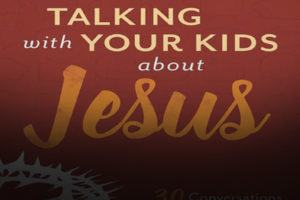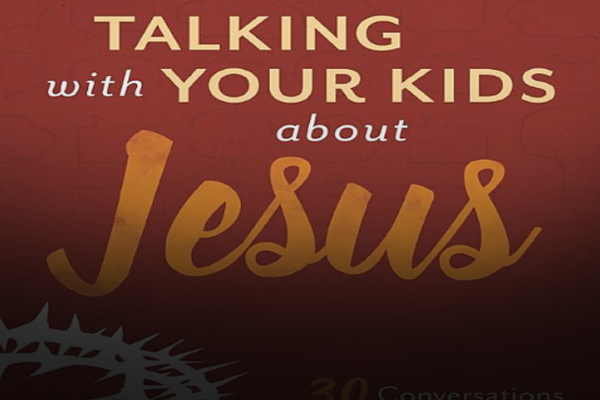
J. Warner: Natasha, for those not familiar with your prior two books, how is this one different?
Natasha: My three books combined cover 100 faith conversations that are most important for families to have, given the secular challenges kids will encounter today. Each one has a different focus:
Keeping Your Kids on God’s Side is an “apologetics 101” for Christian parents, covering a broad survey of subjects on God, Jesus, truth and worldviews, and the Bible.
Talking with Your Kids about God covers 30 conversations specifically about God (e.g., evidence for God’s existence, science and God, the nature of God, and the difference God makes).
My new book, Talking with Your Kids about Jesus, covers 30 conversations specifically about Jesus (e.g., the identity of Jesus, teachings of Jesus, death of Jesus, resurrection of Jesus, and the difference Jesus makes).
These books complement one another and are designed to be a collection to read and use for years to come. They don’t need to be read in any particular order, so parents who haven’t read my prior books will do well to jump into the new one in perfect time for Easter—12 of the 30 conversations are about the death and resurrection of Jesus!
J. Warner: With Easter around the corner, let’s talk about those chapters on Jesus’s death and resurrection. You say in the book that kids need to understand more about Jesus’s death than simply “Jesus died for my sins.” Why is that? How will your book help?
Natasha: Like many kids, I heard hundreds of times growing up that Jesus died for my sins. It was repeated so often in Sunday school that it became like a slogan to me—something repeatedly stated as a fact that I never thought much more about. But there are layers of meaning to that statement that our kids should understand, both to deepen their faith and to help them understand the challenges of skeptics who see the cross as some kind of grotesque event Christians strangely celebrate.
The book helps parents by methodically walking through the key layers of understanding kids need. The six chapters on Jesus’s death answer these questions:
-
-
-
- Did Jesus predict his violent death and resurrection? (I look at the historicity of these important accounts.)
- What’s the relationship between Old Testament animal sacrifices and Jesus’s death? (Ever wonder how to explain to kids why God asked for all those animals to be sacrificed? I walk readers through the sacrificial system and how it pointed to Jesus.)
- Did Jesus die willingly? (Many skeptics today see Jesus’s death as some kind of “cosmic child abuse” by God the Father. In this chapter, I look at where that claim goes so wrong.)
- What did Jesus’s death accomplish? (Contrary to the claims of many progressive Christians, the meaning of Jesus’s death isn’t subjective. Here I explain six objective things Jesus’s death accomplished for us.)
- If Jesus is God, how could he die? (This is a question kids often ask! In this chapter I explain why we have to be careful about saying “God died on the cross.”)
- Where was Jesus between his death and resurrection? (There are some wild speculations about this out there, especially among prosperity gospel preachers!)
-
-
J. Warner: In the next six chapters, you go on to cover major questions related to the resurrection. What do you feel kids are most lacking in understanding on that subject?
Natasha: I’d say there are three things. First, I think they often lack an understanding of why the resurrection matters so much. In other words, if you asked most kids how it would change Christianity if we somehow discovered Jesus wasn’t raised from the dead, I doubt most would know what to say. But Paul says in 1 Corinthians 15:14 that if Jesus was not raised from the dead, our faith is in vain. Jesus’s resurrection validated his predictions and claims to divinity, it confirmed we are no longer in our sins, and it assures us that we, too, will be raised from the dead (1 Cor. 15:20-23). I cover this in chapter 19, “Why does it matter if Jesus was resurrected?”
Second, I think most kids have no idea there is any kind of historical evidence for the resurrection. They think it’s something they need to take on “faith,” without realizing that biblical faith is trusting in what you have good reason to believe is true—it’s not a matter of a blind leap in the dark. The claimed resurrection event is historical in nature, so kids need to understand that there is much we can look at from a historical perspective to evaluate certain facts and potential explanations. The rest of the chapters in my resurrection section walk parents through this:
-
-
-
- What historical evidence is there for Jesus’s resurrection?
- Was Jesus’s tomb really empty?
- Did Jesus’s disciples lie about the resurrection?
- Were Jesus’s disciples mistaken about the resurrection?
- Did people invent the resurrection many years later?
-
-
Third, kids lack a perspective on the worldview assumptions that will inevitably influence a person’s evaluation of the evidence. If a person is committed to an atheistic worldview, they’ll never conclude that a supernatural resurrection best explains the data because they’ve ruled that out beforehand. This raises the question, of course, of what evidence there is for God’s existence. This was the focus on my last book, Talking with Your Kids about God.
J. Warner: How can parents best use your book during this quarantine?
Natasha: As a parent, I feel like there is a lot of pressure right now to somehow make this quarantine the most magical, productive time in history. But just because you and the kids are home, it doesn’t mean all the pieces will suddenly fall into place to have the conversations you’ve always dreamed of. So first and foremost, I want to tell parents to remove that pressure.
That said, when parents do feel like they are moving on from mere survival mode, I’d say my book is very “quarantine friendly” in a couple of key ways. First, the chapters are only about 5 pages each. It’s pretty hard right now to have sustained attention on anything, so this is definitely a plus for parents! Second, every chapter has a step by step conversation guide to help you get the info out of your head and into a practical conversation with your kids. The questions move from easy for the youngest kids to advanced for older ones. This allows families to use the book over years as kids grow, or to have the conversations with kids of varying ages at the same time.
J. Warner: Where can parents learn more about the book and your other work?
Natasha: I blog at www.natashacrain.com. You can see a book trailer, table of contents, and endorsements for Talking with Your Kids about Jesus here. I also have a comparison of my books here, and a FAQ about them here. People can follow me on Facebook here. Thank you!
It’s one thing to fret or complain about young Christians leaving the faith, it’s another to prepare ourselves to be the best Christian apologists (case makers) our kids will ever know. Natasha’s new book, Talking with Your Kids about Jesus, will help you engage your kids in the kinds of conversations that make an eternal difference.
J. Warner Wallace is a Dateline featured Cold-Case Detective, Senior Fellow at the Colson Center for Christian Worldview, Adj. Professor of Christian Apologetics at Talbot School of Theology, Biola University, author of Cold-Case Christianity, God’s Crime Scene, and Forensic Faith, and creator of the Case Makers Academy for kids.
J. Warner Wallace is a Dateline featured cold-case homicide detective, popular national speaker and best-selling author. He continues to consult on cold-case investigations while serving as a Senior Fellow at the Colson Center for Christian Worldview. He is also an Adj. Professor of Christian Apologetics at Talbot School of Theology, Biola University, and a faculty member at Summit Ministries. He holds a BA in Design (from CSULB), an MA in Architecture (from UCLA), and an MA in Theological Studies (from Gateway Seminary).








































